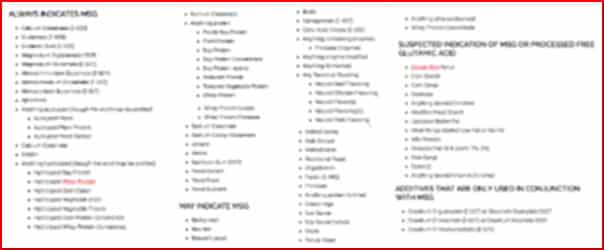
The illustration on this page is a list of the secret names of MSG, blurred on purpose because the people at Mamavation.com went to a lot of work to compile it, so the least we can do is refer readers to their website. MSG is short for monosodium glutamate, also known as glutamic acid or glutamate, but the tricky part is that it appears on food labeling under several dozen terms, some of them very innocent-sounding.
Why the long list? Because the MSG labeling is only required by the Food and Drug Administration if it is 99 percent pure MSG. If the additive is MSG mixed with something else, manufacturers can call it anything. The brand-friendly euphemism is “umami,” which is the taste that keeps people coming back for more.
Thanks to the red-flag-raising efforts of many researchers, a lot of consumers don’t want the stuff in their food. Narrowing the objections down to obesity, there are two major indictments against MSG. When that irresistible umami taste is added to food, people eat a lot more of it and gain weight. More concerning is the evidence that MSG has intrinsic obesogenic qualities that affect the body’s inner workings in ways that are hard to track but increasingly worrisome.
On the other hand, many MSG-positive scientific studies exist, the problem being that they seem to have been paid for and possibly rigged by the manufacturer. The Ajinomoto corporation has also been accused of suppressing data and framing suffering patients as anecdotal-evidence drama queens.
Speaking of studies…
As we have seen, MSG has long been used to make lab rodents plump enough for scientists who require obese rats. After years of knowing that MSG causes animals to gain weight, in 2008 somebody finally decided to see what it does in humans.
University of North Carolina researchers worked with 750 residents of remote villages in China and found that 82 percent of the subjects ate meals prepared with MSG. The subjects were divided into three groups, according to heavy, moderate, or no use of MSG. Hannah Punitha reported,
The researchers found that the group which used the most MSG, were nearly three times more likely to be overweight than non-users.
In the following year, activist Arun Gupta appeared on TV to talk about McDonald’s bacon, remarking with astonishment that it actually contained 18 ingredients in all. These included six different varieties of umami (see Paragraph 1 above), which he described as a “highly addictive” ingredient that “elicits an actual neurochemical, physiological response.”
The Chicken McNugget is another item that suffered from extreme adulteration. Initially, chicken was introduced as a healthy alternative to red meat. According to the discussion on the DemocracyNow.org show hosted by Amy Goodman, “on average, a Chicken McNugget has twice as much fat as a McDonald’s hamburger.” It also contains a hellish cocktail of flavor-enhancing chemical additives — and that doesn’t even include the dipping sauce.
Your responses and feedback are welcome!
Source: “Hidden MSG Ingredients: 90 You Should Avoid,” Mamavation.com
Source: “Flavour Enhancer MSG Causes Obesity Says a Research,” MedIndia.net, 08/14/08
Source: “Bacon as a Weapon of Mass Destruction,” DemocracyNow.org, 08/03/09

 FAQs and Media Requests:
FAQs and Media Requests: 











